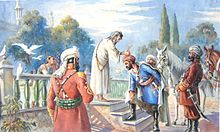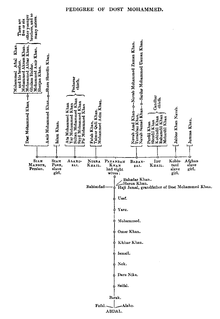Popalzai
| Popalzai پوپلزی | |
|---|---|
 | |
| Ethnicity | Pashtun |
| Location | Afghanistan |
| Parent tribe | Zirak (Durrani) |
| Branches | Sadozai |
| Language | Pashto |
| Religion | |

Popalzai or Popalzay (Pashto: پوپلزی), also known as Popal, are Durrani (formerly called Abdali or Bor Tareen) Pashtuns of Afghanistan. The Popalzai are part of the Zirak confederation of Pashtun tribes.[1] The origin of the Abdali forefathers of the Sadozai tribe is probably the Hephthalites.[2] The forefathers of Ahmad Shāh Durrānī, the founder of the Durrani Empire, were from the Sadozai tribe which is a subtribe of the Popalzai. According to Mohan Lal, the Zirak line begins with Sulaiman Zirak Khan, who was the father of Popalzai, Barakzai, and Alakozai.[3] The tribe's origin is Kandahar, Afghanistan. The majority of the Popalzai live in the southern areas of Afghanistan such as in Kandahar, Helmand or Uruzgan. Some members of the Popalzai tribe have migrated with their families to the European Union, North America, and Oceania. Notable members of the Popalzai tribe include Hamid Karzai and his extended family, Karim Popal, Naim Popal, and Khalida Popal.[4][5]
Notable people
- Abdul Ghani Baradar, co-founder and deputy leader of the Taliban
- Ahmad Shah Durrani, Founder of the Durrani Empire
- Ahmed Wali Karzai
- Hamid Karzai, President of Afghanistan 2001–2014
- Khairullah Khairkhwa
- Jan Mohammad Khan
- Khan Mohammad Khan
- Ghulam Jilani Popal
References
- ^ Giustozzi, Antonio (2012). Decoding the New Taliban: Insights from the Afghan Field (Reprinted ed.). Hurst Publishers. p. 197. ISBN 978-1-84904-226-0.
- ^ Kurbanov, Aydogdy (2010). "The Hephthalites". Refubium. Freie Universität Berlin. doi:10.17169/refubium-12565.
- ^ Life of the Amîr Dost Mohammed Khan, of Kabul: with his political ..., by Mohan Lal, Volume 1. Page 1-3.
- ^ "Hamid Karzai | president of Afghanistan".
- ^ "Karzai family tree". BBC News. 13 July 2011.
